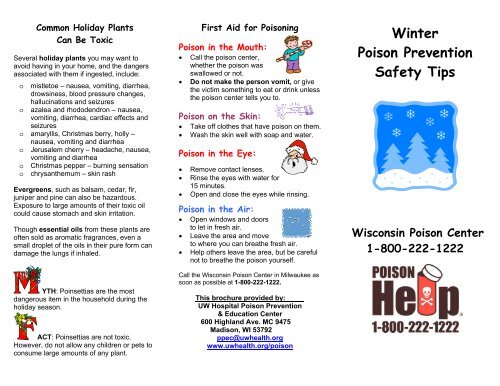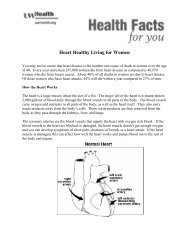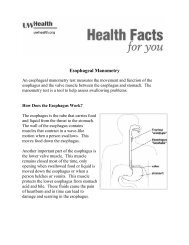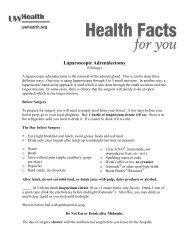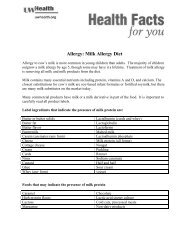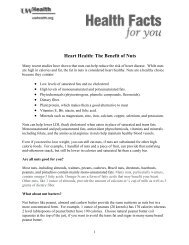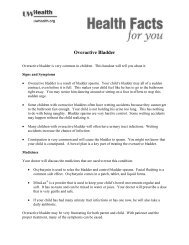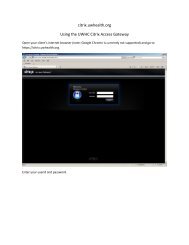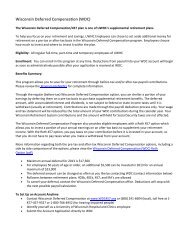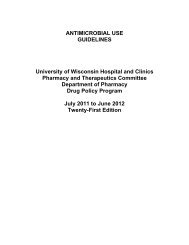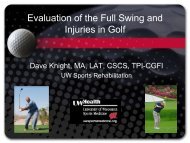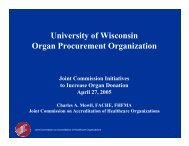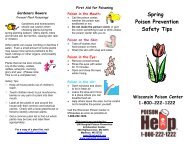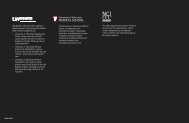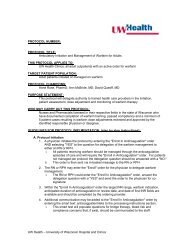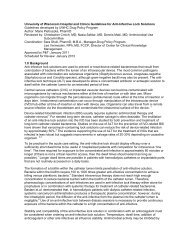Winter Poison Prevention Safety Tips (pdf) - UW Health
Winter Poison Prevention Safety Tips (pdf) - UW Health
Winter Poison Prevention Safety Tips (pdf) - UW Health
You also want an ePaper? Increase the reach of your titles
YUMPU automatically turns print PDFs into web optimized ePapers that Google loves.
Common Holiday Plants<br />
Can Be Toxic<br />
Several holiday plants you may want to<br />
avoid having in your home, and the dangers<br />
associated with them if ingested, include:<br />
o mistletoe – nausea, vomiting, diarrhea,<br />
drowsiness, blood pressure changes,<br />
hallucinations and seizures<br />
o azalea and rhododendron – nausea,<br />
vomiting, diarrhea, cardiac effects and<br />
seizures<br />
o amaryllis, Christmas berry, holly –<br />
nausea, vomiting and diarrhea<br />
o Jerusalem cherry – headache, nausea,<br />
vomiting and diarrhea<br />
o Christmas pepper – burning sensation<br />
o chrysanthemum – skin rash<br />
Evergreens, such as balsam, cedar, fir,<br />
juniper and pine can also be hazardous.<br />
Exposure to large amounts of their toxic oil<br />
could cause stomach and skin irritation.<br />
Though essential oils from these plants are<br />
often sold as aromatic fragrances, even a<br />
small droplet of the oils in their pure form can<br />
damage the lungs if inhaled.<br />
YTH: Poinsettias are the most<br />
dangerous item in the household during the<br />
holiday season.<br />
ACT: Poinsettias are not toxic.<br />
However, do not allow any children or pets to<br />
consume large amounts of any plant.<br />
First Aid for <strong>Poison</strong>ing<br />
<strong>Poison</strong> in the Mouth:<br />
• Call the poison center,<br />
whether the poison was<br />
swallowed or not.<br />
• Do not make the person vomit, or give<br />
the victim something to eat or drink unless<br />
the poison center tells you to.<br />
<strong>Poison</strong> on the Skin:<br />
• Take off clothes that have poison on them.<br />
• Wash the skin well with soap and water.<br />
<strong>Poison</strong> in the Eye:<br />
• Remove contact lenses.<br />
• Rinse the eyes with water for<br />
15 minutes.<br />
• Open and close the eyes while rinsing.<br />
<strong>Poison</strong> in the Air:<br />
• Open windows and doors<br />
to let in fresh air.<br />
• Leave the area and move<br />
to where you can breathe fresh air.<br />
• Help others leave the area, but be careful<br />
not to breathe the poison yourself.<br />
Call the Wisconsin <strong>Poison</strong> Center in Milwaukee as<br />
soon as possible at 1-800-222-1222.<br />
This brochure provided by:<br />
<strong>UW</strong> Hospital <strong>Poison</strong> <strong>Prevention</strong><br />
& Education Center<br />
600 Highland Ave. MC 9475<br />
Madison, WI 53792<br />
ppec@uwhealth.org<br />
www.uwhealth.org/poison<br />
<strong>Winter</strong><br />
<strong>Poison</strong> <strong>Prevention</strong><br />
<strong>Safety</strong> <strong>Tips</strong><br />
Wisconsin <strong>Poison</strong> Center<br />
1-800-222-1222<br />
©2003 Illinois <strong>Poison</strong> Center<br />
©2003 Illinois <strong>Poison</strong> Center
Tis’ the Season…for coughing<br />
and sneezing!<br />
Households tend to stock more medicines for<br />
treatment of cold and flu symptoms during the<br />
wintertime. Make sure your medicine cabinet<br />
is safe for your family.<br />
Always read the label before giving or<br />
taking medicine.<br />
Use the measuring device that is<br />
packaged with the medicine – and<br />
remember, more does not necessarily<br />
mean better.<br />
Never call medicine candy, or make a<br />
game out of taking it.<br />
Never give a child someone else’s<br />
medicine.<br />
Don’t Let Alcohol Become A<br />
Party Hazard<br />
Alcohol can be very dangerous to small<br />
children. For example, ingesting<br />
three ounces of hard liquor<br />
(i.e., whiskey, vodka or gin)<br />
is potentially fatal to a child<br />
weighing 25 pounds. Be<br />
aware of children who may<br />
drink unfinished<br />
alcoholic beverages left<br />
out during holiday parties<br />
and celebrations. You also should be aware<br />
that alcohol is a key ingredient in mouthwash,<br />
liquid cold products and colognes.<br />
Safe Food Preparation<br />
In order to prevent<br />
your family and<br />
friends from<br />
becoming ill from<br />
spoiled or<br />
mishandled foods,<br />
ensure that your<br />
holiday meals are safely prepared.<br />
Wash your hands thoroughly with hot,<br />
soapy water before preparing any food<br />
and after handling raw meat, poultry, fish<br />
or eggs.<br />
Store raw food below cooked food in the<br />
refrigerator so raw food cannot drip into<br />
cooked food and contaminate it.<br />
Wash counters and utensils thoroughly<br />
before and after preparing foods.<br />
Use separate cutting boards for meats,<br />
poultry and fish.<br />
Cook food adequately – rare meats have<br />
a higher risk of containing unhealthy levels<br />
of bacteria. Cooking to the recommended<br />
internal temperature kills bacteria.<br />
Put food away no more than three hours<br />
after a meal or buffet.<br />
Beware of Holiday Decorations<br />
• Angel hair consists of spun glass, which<br />
can penetrate the skin, eyes and mouth<br />
on contact, causing severe<br />
irritation and pain.<br />
• Christmas tree ornaments<br />
can be a choking hazard.<br />
• Snow globes are glass or plastic domes<br />
filled with water. The snow is made from<br />
a non-toxic chalk-like or plastic substance.<br />
However, the fluid contained in the globe<br />
could become contaminated with harmful<br />
bacteria over time, and cause vomiting<br />
and diarrhea if ingested.<br />
• Snow spray used to decorate windows,<br />
mirrors and trees can cause eye damage<br />
if sprayed directly into the eye from a<br />
pressurized container.<br />
• Oil candle lamps contain<br />
liquid fuels composed of<br />
hydrocarbons. When a<br />
person drinks and chokes<br />
these products enter the<br />
lungs, and severe breathing problems<br />
which can lead to death may develop. All<br />
hydrocarbon-containing products should<br />
be kept out of children’s reach.<br />
• Fireplace powders and logs that burn<br />
different colors contain heavy<br />
metals, such as lead, copper,<br />
barium and selenium. Ingestion of<br />
such metals can cause intense<br />
stomach and intestinal upset.<br />
© Illinois <strong>Poison</strong> Center


